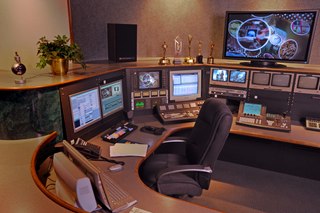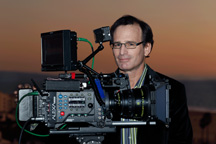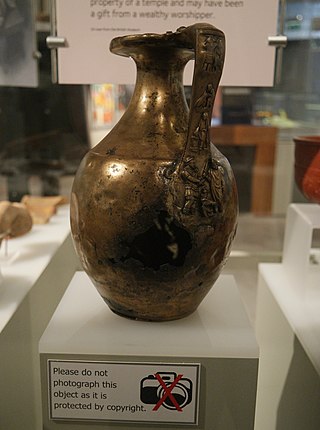Related Research Articles

Non-linear editing is a form of offline editing for audio, video, and image editing. In offline editing, the original content is not modified in the course of editing. In non-linear editing, edits are specified and modified by specialized software. A pointer-based playlist, effectively an edit decision list (EDL), for video and audio, or a directed acyclic graph for still images, is used to keep track of edits. Each time the edited audio, video, or image is rendered, played back, or accessed, it is reconstructed from the original source and the specified editing steps. Although this process is more computationally intensive than directly modifying the original content, changing the edits themselves can be almost instantaneous, and it prevents further generation loss as the audio, video, or image is edited.
Progressive scanning is a format of displaying, storing, or transmitting moving images in which all the lines of each frame are drawn in sequence. This is in contrast to interlaced video used in traditional analog television systems where only the odd lines, then the even lines of each frame are drawn alternately, so that only half the number of actual image frames are used to produce video. The system was originally known as "sequential scanning" when it was used in the Baird 240 line television transmissions from Alexandra Palace, United Kingdom in 1936. It was also used in Baird's experimental transmissions using 30 lines in the 1920s. Progressive scanning became universally used in computer screens beginning in the early 21st century.

The Internet Archive is an American non-profit organization founded in 1996 by Brewster Kahle that runs a digital library website, archive.org. It provides free access to collections of digitized media including websites, software applications, music, audiovisual, and print materials. The Archive also advocates a free and open Internet. Its mission is committing to provide "universal access to all knowledge".
Getty Images Holdings, Inc. is a visual media company and supplier of stock images, editorial photography, video, and music for business and consumers, with a library of over 477 million assets. It targets three markets—creative professionals, the media, and corporate.

BENlabs, formerly BEN Group Inc., is a Los Angeles–based product placement, influencer marketing and licensing company. The company offers AI-driven product placement, influencer marketing services, music partnerships, rights clearance, and personality rights management services for the entertainment industry.

Stock photography is the supply of photographs that are often licensed for specific uses. The stock photo industry, which began to gain hold in the 1920s, has established models including traditional macrostock photography, midstock photography, and microstock photography. Conventional stock agencies charge from several hundred to several thousand US dollars per image, while microstock photography may sell for around US$0.25 cents. Professional stock photographers traditionally place their images with one or more stock agencies on a contractual basis, while stock agencies may accept the high-quality photos of amateur photographers through online submission.

Film colorization is any process that adds color to black-and-white, sepia, or other monochrome moving-picture images. It may be done as a special effect, to "modernize" black-and-white films, or to restore color segregation. The first examples date from the early 20th century, but colorization has become common with the advent of digital image processing.
Digital asset management (DAM) and the implementation of its use as a computer application is required in the collection of digital assets to ensure that the owner, and possibly their delegates, can perform operations on the data files.
Stock footage, and similarly, archive footage, library pictures, and file footage is film or video footage that can be used again in other films. Stock footage is beneficial to filmmakers as it saves shooting new material. A single piece of stock footage is called a "stock shot" or a "library shot". Stock footage may have appeared in previous productions but may also be outtakes or footage shot for previous productions and not used. Examples of stock footage that might be utilized are moving images of cities and landmarks, wildlife in their natural environments, and historical footage. Suppliers of stock footage may be either rights managed or royalty-free. Many websites offer direct downloads of clips in various formats.

In filmmaking and video production, footage is raw, unedited material as originally filmed by a [[movie came ra]] or recorded by a video camera, which typically must be edited to create a motion picture, video clip, television show, or similar completed work.

Digital cinematography is the process of capturing (recording) a motion picture using digital image sensors rather than through film stock. As digital technology has improved in recent years, this practice has become dominant. Since the 2000s, most movies across the world have been captured as well as distributed digitally.

Google Books is a service from Google that searches the full text of books and magazines that Google has scanned, converted to text using optical character recognition (OCR), and stored in its digital database. Books are provided either by publishers and authors through the Google Books Partner Program, or by Google's library partners through the Library Project. Additionally, Google has partnered with a number of magazine publishers to digitize their archives.
Shutterstock, Inc. is an American provider of stock photography, stock footage, stock music, and editing tools; it is headquartered in New York. Founded in 2002 by programmer and photographer Jon Oringer, Shutterstock maintains a library of around 200 million royalty-free stock photos, vector graphics, and illustrations, with around 10 million video clips and music tracks available for licensing. Originally a subscription site only, Shutterstock expanded beyond subscriptions into a la carte pricing in 2008. It has been publicly traded on the New York Stock Exchange since 2012. In January 2025, it was announced that the company would be merging with Getty Images.
In filmmaking, the rough cut is the second of three stages of offline editing. The term originates from the early days of filmmaking when film stock was physically cut and reassembled, but is still used to describe projects that are recorded and edited digitally.

The Apollo 11 missing tapes were those that were recorded from Apollo 11's slow-scan television (SSTV) telecast in its raw format on telemetry data tape at the time of the first Moon landing in 1969 and subsequently lost.

A copyfraud is a false copyright claim by an individual or institution with respect to content that is in the public domain. Such claims are unlawful, at least under US and Australian copyright law, because material that is not copyrighted is free for all to use, modify and reproduce. Copyfraud also includes overreaching claims by publishers, museums and others, as where a legitimate copyright owner knowingly, or with constructive knowledge, claims rights beyond what the law allows.

A digital library is an online database of digital objects that can include text, still images, audio, video, digital documents, or other digital media formats or a library accessible through the internet. Objects can consist of digitized content like print or photographs, as well as originally produced digital content like word processor files or social media posts. In addition to storing content, digital libraries provide means for organizing, searching, and retrieving the content contained in the collection. Digital libraries can vary immensely in size and scope, and can be maintained by individuals or organizations. The digital content may be stored locally, or accessed remotely via computer networks. These information retrieval systems are able to exchange information with each other through interoperability and sustainability.
BBC Motion Gallery is the footage licensing division of BBC Studios. It offers creative professionals access to a collection of stock footage with licensing worldwide.
FOCAL International is the trade association representing stock footage companies, post-production facilities and individuals involved in the use of footage, still images and audio in all forms of media production. It represents more than 300 companies and individuals involved in media production, asset management, preservation of historical archives, film restoration and post-production.
Pond5 is a New York–based online marketplace for royalty-free media. The company licenses stock footage, stock music, stock photography, sound effects, Adobe After Effects templates, and 3D models. Pond5 claims to have the world's largest collection of stock footage, and that they host more than 44 million clips as of January 2025.
References
- 1 2 At the heart of the news industry: framepool markets footage from afp, FOCAL International, archived from the original on October 14, 2013, retrieved August 29, 2013
- ↑ Visual video search with Framepool, pixolution, March 31, 2014, archived from the original on April 3, 2014, retrieved September 16, 2014
- ↑ "Objets Troués", PAGE Magazin, vol. 13, no. 9, pp. 74–77, 2013[ dead link ]
- ↑ Iron Man 3.
- ↑ The Men Who Stare at Goats.
- ↑ Over three million stock footage screening clips now accessible through footage.net, FOCAL International, archived from the original on March 2, 2014, retrieved August 29, 2013
- ↑ "Press Room". Footage.net. Archived from the original on October 14, 2013. Retrieved October 14, 2013.